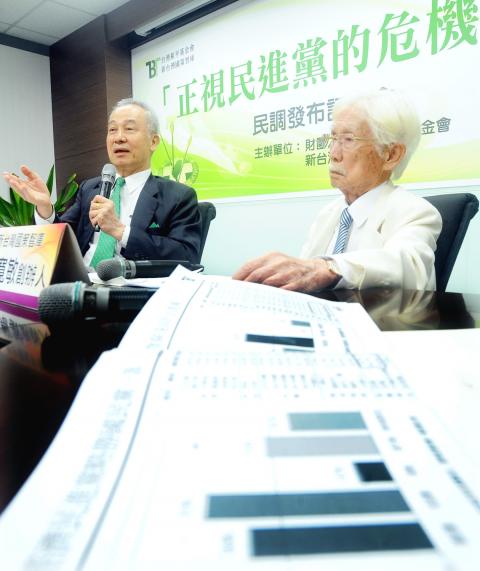Concern regarding the Democratic Progressive Party’s (DPP) ability to govern effectively remains strong despite the poor performance of President Ma Ying-jeou’s (馬英九) Chinese Nationalist Party (KMT) administration, a public opinion survey released yesterday showed.
The poll, released by the Taiwan Brain Trust (TBT) think tank one week before the DPP’s party congress on Saturday, and one day before the anniversary of the start of Ma’s second term, found that respondents had at least six main concerns over the DPP, in particular its factionalism and somewhat vague policy on China.
The six concerns were a relatively low approval rating (despite the KMT faring worse), fierce factionalism, the party’s failure to clearly present public policies, its unclear China policy, its nominal party member phenomenon and its perceived lack of vision and determination to enact reform, Taiwan Brain Trust chairman Wu Rong-i (吳榮義) told a press conference.

Photo: Lin Cheng-kung, Taipei Times
The survey also showed strong discontent with the KMT, with 66 percent of respondents saying they are not satisfied with the KMT administration’s performance, while 57.8 percent of those polled said the party deserved to lose the next presidential election.
However, 44.3 percent of respondents said they did not believe the DPP would perform any better as a ruling party, and while the DPP ranked better than the KMT on the economy — a 31.5 percent approval rating versus the KMT’s 24.9 percent — and was seen as a less corrupt party — 34.2 percent versus the KMT’s 38.2 percent — the ratings were so close that it appears that many respondents think the two parties are equally untrustworthy.
“The DPP is likely to lose the next presidential election if it fails to meet the public’s expectations,” said Koo Kwang-ming (辜寬敏), founder of the think tank and a staunch supporter of Taiwanese independence.
“Taiwanese have spoiled the DPP in the past. The party has to realize that Taiwanese may not continue to vote for it,” Koo added.
When respondents were asked why they were dissatisfied with the DPP and allowed to choose multiple answers, unhealthy competition between DPP factions ranked highest and was selected by 73.8 percent of respondents.
Poor policy formulation ranked second with 69.3 percent, cross-strait policy placed third with 58.4 percent, followed by political ideology (49.4 percent) and a perceived dearth of talent in the party (43.9 percent).
On cross-strait affairs, 47.1 percent of respondents said they knew that the DPP had recently changed its China policy, while 35 percent said they were unaware of the policy change and 17.9 percent did not answer.
However, only 15.8 percent of those polled said they understood what the DPP’s China policy entails, while 62.5 percent of respondents said they were not aware of the contents of the policy.
More than half, or 54.5 percent, of respondents deemed the DPP’s nominal member phenomenon as “serious” and 63.6 percent of respondents said the perennial problem would affect the party’s long-term development.
Despite Ma receiving an approval rating as low as 13 percent, the survey found that 48.7 percent of respondents did not support recalling the president, with 25.3 percent saying they were “strongly unsupportive” of such a move.
Only 40.9 percent of respondents supported the recall option.
The poll, conducted between May 11 and 13, collected 1,070 valid samples and had a margin of error of 3 percentage points.

Taipei has once again made it to the top 100 in Oxford Economics’ Global Cities Index 2025 report, moving up five places from last year to 60. The annual index, which was published last month, evaluated 1,000 of the most populated metropolises based on five indices — economics, human capital, quality of life, environment and governance. New York maintained its top spot this year, placing first in the economics index thanks to the strength of its vibrant financial industry and economic stability. Taipei ranked 263rd in economics, 44th in human capital, 15th in quality of life, 284th for environment and 75th in governance,

Greenpeace yesterday said that it is to appeal a decision last month by the Taipei High Administrative Court to dismiss its 2021 lawsuit against the Ministry of Economic Affairs over “loose” regulations governing major corporate electricity consumers. The climate-related lawsuit — the first of its kind in Taiwan — sought to require the government to enforce higher green energy thresholds on major corporations to reduce emissions in light of climate change and an uptick in extreme weather. The suit, filed by Greenpeace East Asia, the Environmental Jurists Association and four individual plaintiffs, was dismissed on May 8 following four years of litigation. The

A former officer in China’s People’s Liberation Army (PLA) who witnessed the aftermath of the 1989 Tiananmen Square massacre has warned that Taiwan could face a similar fate if China attempts to unify the country by force. Li Xiaoming (李曉明), who was deployed to Beijing as a junior officer during the crackdown, said Taiwanese people should study the massacre carefully, because it offers a glimpse of what Beijing is willing to do to suppress dissent. “What happened in Tiananmen Square could happen in Taiwan too,” Li told CNA in a May 22 interview, ahead of the massacre’s 36th anniversary. “If Taiwanese students or

The New Taipei City Government would assist relatives of those killed or injured in last month’s car-ramming incident in Sansia District (三峽) to secure compensation, Mayor Hou You-yi (侯友宜) said yesterday, two days after the driver died in a hospital. “The city government will do its best to help the relatives of the car crash incident seek compensation,” Hou said. The mayor also said that the city’s Legal Affairs, Education and Social Welfare departments have established a joint mechanism to “provide coordinated assistance” to victims and their families. Three people were killed and 12 injured when a car plowed into schoolchildren and their